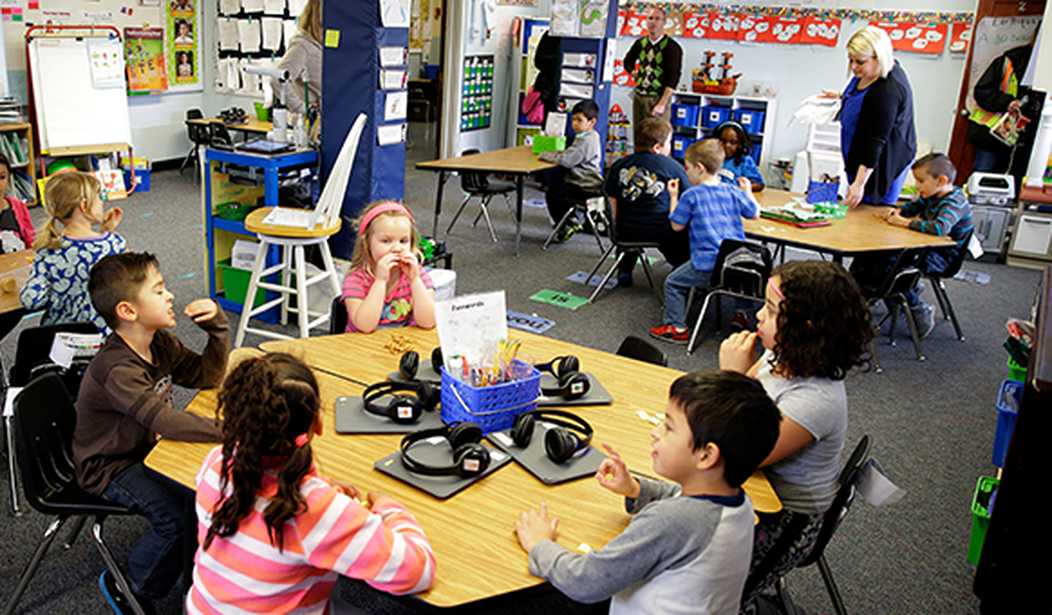A couple weeks ago David wrote about a piece that appeared in the NY Times about boys falling behind girls in a number of different metrics including education. Over the weekend the Times published a follow-up looking at one of the reasons boys are struggling in school. The gist is that the gender gap in school performance now starts as early as kindergarten thanks in part to changes in what is being taught in kindergarten.
Across measures of kindergarten readiness — including reading, math, motor skills and behaviors like socializing, paying attention and regulating emotions — girls score higher than boys...
Kindergarten has become significantly more academic because of the effects of a national law passed in 2001, with children expected to spend more time sitting still and learning math and reading — and many boys do not enter with the skills to meet those expectations.
It sounds pretty simplistic but apparently the ability to just sit still and listen is a big advantage for young children and boys just aren't as good at it.
Jayanti Owens, who studies inequality in schools at the Yale School of Management, has found that boys’ behavior at ages 4 and 5 predicted the amount of schooling they finished by their mid-20s.
Skills build on themselves, so children who don’t master kindergarten phonics or counting could remain behind in future grades. And children who struggle with academics or behavior risk developing negative perceptions of themselves as learners...
Jordan Green, who lives in Tulsa, Okla., said her son just finished kindergarten “by the skin of his teeth.” In pre-K, he was “always in trouble for being too rowdy” — and his punishment was to skip recess, which Ms. Green said backfired because he couldn’t let out his energy. In kindergarten, he was behind school benchmarks for learning letters and numbers.
There is also a big racial gap present in what's being called kindergarten readiness. So, for instance, about half of white girls and nearly 40% of white boys are deemed kindergarten ready but the figures for Hispanic kids are 22% for girls and 16% for boys. Kindergarten readiness isn't a measure of intelligence. It has more to do with socialization and inherent differences between the sexes.
Perhaps the most comprehensive study, the Early Childhood Longitudinal Study, gathers information from children, parents and teachers, and follows children over time. It has found that when children start school, cognitive gaps are small — slightly favoring girls in reading and boys in math — but that gaps in skills like studiousness, persistence and self-control are bigger...
Boys tend to mature later, said Lise Eliot, a professor of neuroscience at Rosalind Franklin University, especially when it comes to executive function — skills like paying attention, regulating emotions and inhibiting inappropriate behaviors.
While these differences can start small, she said, they can become bigger through socialization — the ways in which parents and teachers have different expectations of boys and girls, and treat them differently. Executive function is crucial for learning and academic success, a variety of research has shown, and the gender gap in when children develop these skills explains much of the achievement gap in early elementary school.
These differences became even more significant as US kindergarten's became slightly more academic in the wake of the No Child Left Behind law. Boys were probably always at a disadvantage but trying to teach math and reading a year earlier emphasized the differences. Girls were more likely to pick it up and therefore to be slightly ahead in 1st grade.
The article ends with some suggestions about what to do about these performance gaps, some of which amount to giving boys some time to mature, i.e. having them start kindergarten a year later or making kindergarten more about play and less about academics.
I'm not sure if these are good ideas, particularly the last one. Shouldn't girls be encouraged to learn as quickly as they are able? We don't want to hold the girls back so the boys can catch up. But clearly boys are struggling and the current system just isn't working as well for them.







Join the conversation as a VIP Member